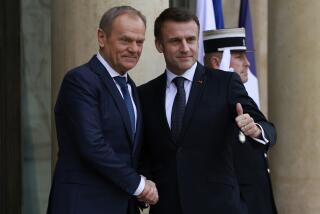Europe Forms Battle Plan to Fight U.S. TV
- Share via
PARIS — Television and film industry executives, artists and government officials from 26 European countries on Monday endorsed plans to create new Europe-wide institutions and promote greater cooperation as a way to fight growing international competition, mainly from the United States.
However, deep divisions that emerged in discussions on the mechanics of cooperation reflected the distance between the participants’ aspirations and present realities.
The meeting took place as Europe’s once-staid television industry embarks on a marketing revolution.
“A new industry is emerging in Europe,” Luis Solana, head of Spanish state television, told the closing plenary session. “Television, always a cultural force in Europe, is emerging as a commercial battlefield.”
Solana said there was a consensus among those at the meeting against protective quotas to shelter European industry from American productions.
“That kind of barrier weakens the will to fight and be strong,” he said. “It is a violation of the freedom of thought and expression that is part of the European cultural tradition.”
He called instead for help to sweep away the legal and fiscal barriers that stifle co-production.
“Only by co-production can we meet the American challenge,” he declared.
But Italian director Ettore Scola talked of American cultural colonization.
“We accept the principle of European preference for steel and cars,” he said. “Why not for cultural products?”
Foreign ministers of the 12 nations of the European Community are expected to approve a legally binding directive today that will pledge the member nations to limit imported productions to 50% “where practicable.”
The U.S. government and American producers have strongly opposed such action.
Jean Drucker, director general of the French television station M6, said Europeans face a major task to increase the quality and quantity of its production in the years ahead.
He talked of the need for private and public money to support a “huge structure to replace the cottage-industry nature of European television and audio-visual industries.”
The advent of cable and satellite broadcasting is expected to double the number of channels in Europe over the next decade.
Drucker said improvements in training and new sources of funding such as venture capital are vital to produce “quality products that will last, not cheap productions with short shelf-lives.”
The gap between future demand and production in Europe, he said, means that every hour of programing needs at least eight to 10 hours of transmission--either through repeats on secondary, specialty channels or by marketing to several countries.
Drucker said that within five years, Europe’s television industry will be capable of producing only 2,500 hours of prime-time, up-market fiction viewing, but that demand will by then exceed 16,000 hours.
“We’ll be hiding our heads in the sand if we think we can keep buying from Hollywood,” he said. “That’s suicidal. Hollywood can’t even keep up. We’ve used 15 years of Hollywood in the last three years. Europeans who want to capture a share of the market must produce for themselves.”
He said that “at stake is nothing less than Europe’s audio-visual industry and its culture” and that “we have to gather our forces and fight.”
Jacques Delors, president of the EC’s Executive Commission, proposed that $275 million in EC funds be earmarked to help the industry over a five-year period.
In specific action, the meeting expressed:
-- The need for a European postgraduate school to train writers, directors and producers in a way that will strengthen the link between education and industry. The school would encourage the development of co-productions. Nine of the 26 nations represented have no national film and television academies for professional training.
-- Support for creation of a European Film-Television Agency to strengthen ties between national industries. Initially, this agency would serve as an information clearinghouse, but would eventually coordinate, plan and conduct research on such subjects as audience reaction and new technology.
-- Agreement to expand the European Script Fund to cover documentaries and artistic programs, boost its funding and open it to artists from all contributing European countries. The fund, presently $2.2 million a year, supports fiction appealing to European audiences written by residents of the 12-nation European Community.
The meeting’s conclusions are to go before an EC-dominated international coordinating committee for possible funding.
Representatives at the Paris meeting said European audio-visual works should foster and preserve a “European cultural identity, founded on a diversity of cultures, ideologies and languages.”
A small working group assigned to define European identity admitted that a clear definition was elusive, but added, “The common base of European culture becomes patently obvious when it is compared with the culture of the Ibu, Chinese or American Indian.”
The participation of delegates from the Soviet Union, Poland and Hungary in free-wheeling discussions on program content and regulations reflected the depth and pace with which political change is unfolding in Europe and how rapidly any working definition of European identity can change.
More to Read
Sign up for Essential California
The most important California stories and recommendations in your inbox every morning.
You may occasionally receive promotional content from the Los Angeles Times.













